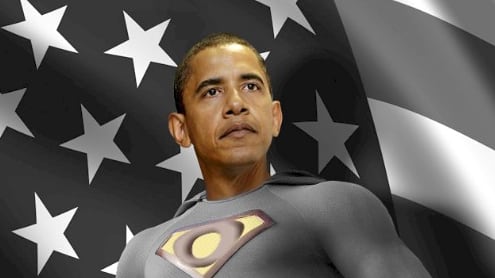
Is it just me, or does Barack Obama seem different since health care passed? He’s sticking it to the Senate by appointing 15 nominees while it is on recess; he’s sticking it to Benjamin Netanyahu by not backing down from demands that Israel halt building in East Jerusalem; he’s sticking it to the banks by aggressively pushing financial reform. It’s hard to believe that only two months ago, Paul Krugman announced that “I’m pretty close to giving up on Mr. Obama, who seems determined to confirm every doubt I and others ever had about whether he was ready to fight for what his supporters believed in.”
What’s happened? Obama fired his air traffic controllers.
In Washington, for the first time in his presidency, Obama is feared.
Let me explain. A president doesn’t define his political era merely by getting elected. Dwight Eisenhower got elected twice, but never challenged the welfare state built by the Franklin Roosevelt. Bill Clinton got elected twice too, but never successfully challenged the dismantling of the welfare state undertaken by Ronald Reagan. A president defines his age by changing the rules of the game, altering the conventional wisdom about what is politically possible.
In that sense, Ronald Reagan was our last era-defining president. But the Age of Reagan didn’t begin when he took the oath of office. Initially, many observers suspected that the Gipper would have to sharply curtail his right-wing ambitions in order to politically survive. At the 1980 convention, Reagan had almost made Gerald Ford his running mate, thus giving the moderate ex-president (and Henry Kissinger, who would have become secretary of State as part of the deal) veto power over his agenda. Reagan ended up winning without Ford’s help, but he didn’t even crack 51 percent of the vote, and Democrats retained their four-decade-old majority in the House.
The Age of Reagan only really began seven months into his presidency, when he fired the air traffic controllers. By law, the controllers weren’t allowed to strike. But they had legitimate complaints, and most observers assumed that the Reagan administration would negotiate a compromise, which was what most former presidents had done in high-profile labor disputes. A delegation of former Republican secretaries of Labor even offered to mediate. Reagan, however, didn’t want to help labor and management reach a deal. He wanted to send a message that 45 years after FDR’s Wagner Act, which had made labor unions a powerful force in American life, labor was about to be crushed. He gave the striking air traffic controllers 48 hours to return to work; then fired the lot of them. America’s air traffic control system didn’t fully recover until 1988, but Reagan was suddenly feared, not only at home, but abroad. The rules of the political game had changed. When House Speaker Tip O’Neill visited Moscow a year later, the thing that Soviet leaders wanted to talk about most was Reagan’s handling of the air traffic controllers’ strike.
With the passage of health care, Obama has now had his air-traffic controllers’ moment. When Scott Brown won in Massachusetts, it convinced many political observers that the old rules still applied. The country was still basically suspicious of big government, and thus, the only way for a Democratic president to survive was to do what Bill Clinton did after 1994: content himself with incremental change, accept the political parameters that Reagan established, be a Democratic Eisenhower.
When Obama decided to push for comprehensive reform anyway, he signaled that he would not play that role. And when he and the Democrats won, they blew up the old political order. In Washington, for the first time in his presidency, Obama is feared. Suddenly, Democrats are not so terrified about the midterm elections. Influential conservatives like David Frum are scolding their party’s leaders for not cutting a bipartisan deal. The Russians have backed down and signed an arms-control pact that doesn’t scrap missile defense in Eastern Europe. As Helene Cooper of The New York Times recently put it, “there is a swagger emanating from the White House that suggests he may now have acquired a liking for the benefits of sticking his neck out to lead.”
Will Obama become hugely popular anytime soon? Probably not. Reagan and the GOP still got clobbered in the 1982 midterm elections, largely because the country was in deep recession. And Obama and the Democrats will probably suffer this fall as well. But if the economy recovers in 2011 and 2012, and Obama rides that recovery to reelection, as Reagan did in 1984, he will be able to say he changed the rules of the political game, and won a mandate from the country. Then we’ll know for sure what more and more people already suspect: The Age of Reagan is over. Welcome to the Age of Obama.
Peter Beinart, senior political writer for The Daily Beast, is associate professor of journalism and political science at City University of New York and a senior fellow at the New America Foundation. His new book, The Icarus Syndrome: A History of American Hubris, will be published by HarperCollins in June. Follow him on Twitter and Facebook.






